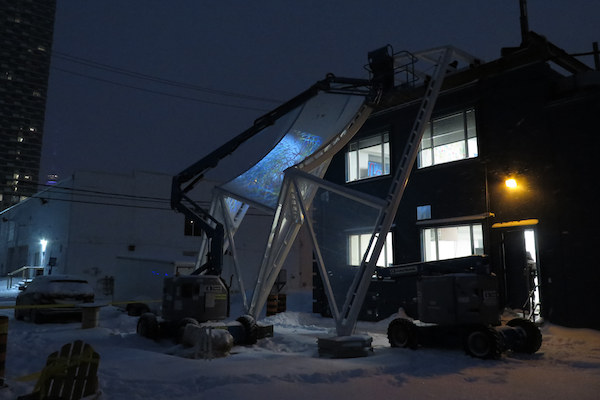testsetset
Raincoats designed for buildings. Hexagonal, heated pavement. Object-classifying cameras. That’s just a sampling of the prototypes Alphabet subsidiary Sidewalk Labs today detailed at an event in Toronto — ideas it says it’s been exploring for the Toronto urban redevelopment project announced last year.
“The weather plays a big role in determining how much time we spend outdoors,” Sidewalk Labs wrote in a blog post. “While the seasons drive the character of how we live in Toronto — trips to the island during the summer or pumpkin parades in the fall — it is no secret that outdoor activity is concentrated in the six-month period from April through October when the weather is pleasant. [These are] some of ideas … [to] make outdoor public space the social default year-round.”
So what’s a “building raincoat,” exactly? Sidewalk Labs describes it as an adjustable awning made from a lightweight, transparent material — ethylene tetrafluoroethylene — durable enough to withstand rain, wind, and sun. It attaches to the sides of tall structures and anchors into street pavers, and extends outward from the edge to protect the sidewalk below from the elements.

Above: Sidewalk Labs’ “building raincoats.”
As for the hexagonal paving system, it comprises precast, modular concrete slabs that can be individually picked up, replaced, and geothermally heated to clear snow and ice. Novelly, each tile sports LEDs that can be used to direct pedestrian traffic and signal things like road closures, special events, and pop-up markets.
June 5th: The AI Audit in NYC
Join us next week in NYC to engage with top executive leaders, delving into strategies for auditing AI models to ensure fairness, optimal performance, and ethical compliance across diverse organizations. Secure your attendance for this exclusive invite-only event.
Also in tow at Friday’s event were sensors from civic technology startup Numina that use computer vision to differentiate objects within their field of view into categories such as “pedestrian,””cyclist,” “bus,” and “truck.” (Numina has already piloted them in cities like St. Louis, Jacksonville, and downtown Brooklyn.)
Sidewalk Labs formally unveiled plans for Quayside, a new “smart” waterfront neighborhood in Toronto, last April, with the stated goals of conserving energy, increasing land usage, and cutting costs in one of the world’s priciest housing markets. The government-backed agency Waterfront Toronto set aside the land it intends to develop — a 12-acre former industrial area east of downtown on Lake Ontario — in March 2017. And if all goes according to plan, it’ll set the stage for a larger, 350-acre waterfront “innovation district” with a light-rail extension and underground infrastructure.
Sidewalk Labs’ initial proposal included autonomous vehicles; a thermal grid that doesn’t use fossil fuels; low-cost modular buildings; fiber-optic plugs; and robotic delivery and waste-management systems. It invested $50 million for “testing and engagement” early last year, and hopes to break ground in 2020 — two years before the first residents move in.
It has since attracted controversy, however.
In October, Ann Cavoukian, Ontario’s former privacy commissioner, became the fourth project adviser to resign over concerns the “treasure trove” of information collected by its technologies will be vulnerable to attacks — or used to track behavior. Sidewalk Labs previously said it will anonymize the data it sweeps up, but that it can’t guarantee other groups involved in the project will do the same.


